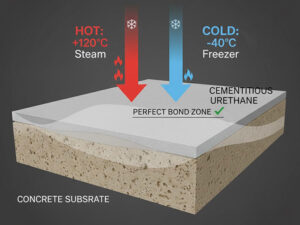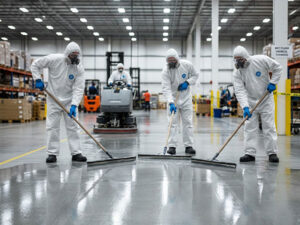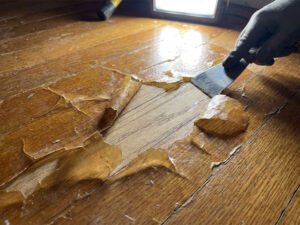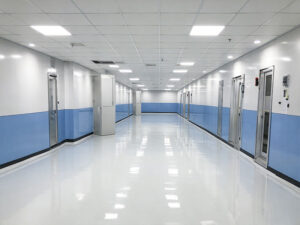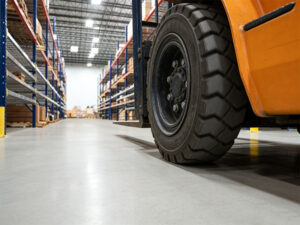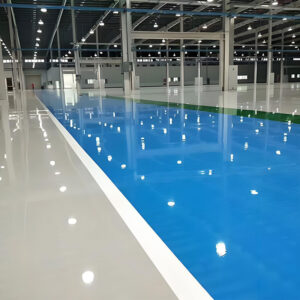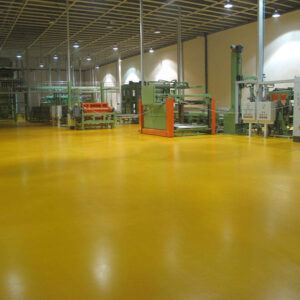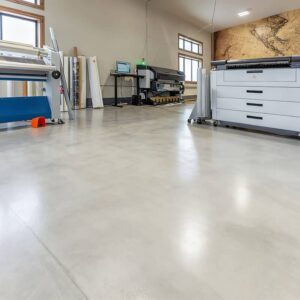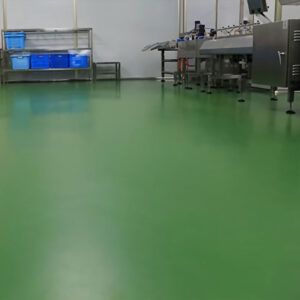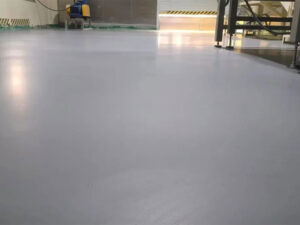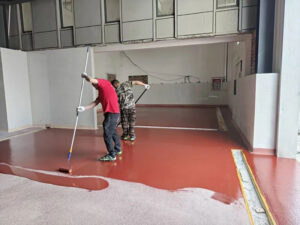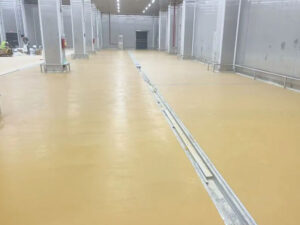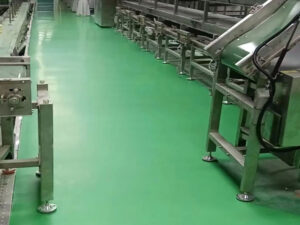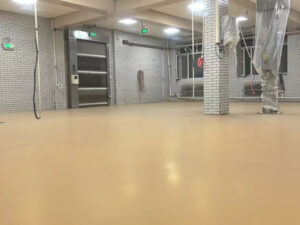I. Introduction
1.1 Special Requirements for Flooring Materials in the Food Processing Industry
The food processing industry is a field with extremely high requirements for hygiene and safety. The particularity of its production environment determines strict requirements for flooring materials. Firstly, hygiene is the primary consideration in the food processing industry. During the food processing process, the floor needs to be kept clean at all times to prevent the accumulation of bacteria, dirt, and other pollutants, thereby avoiding food contamination. For example, in a meat processing workshop, blood, grease, etc. are likely to splash onto the floor. If the floor cannot effectively resist the erosion of these substances, it will become a breeding ground for bacteria, seriously affecting food safety.
Secondly, various chemical cleaners and disinfectants are often used in the food processing environment, and these chemicals are highly corrosive. Therefore, flooring materials need to have good chemical resistance and be able to withstand the long – term erosion of these chemicals without being damaged. In addition, food processing workshops usually need to be cleaned frequently to maintain environmental hygiene. This requires the flooring material to have a smooth surface, be less likely to accumulate dirt, and be easy for daily cleaning and disinfection.
Moreover, there are usually a large number of mechanical equipment and the handling of goods in the food processing workshop, which places high requirements on the wear resistance and compression resistance of the floor. The floor needs to be able to withstand the rolling of heavy equipment and the frequent movement of people and goods without wear, cracking, and other problems. At the same time, to ensure the safety of workers, the floor also needs to have good anti – slip performance, especially in wet environments such as cleaning areas and cold storage, to reduce the occurrence of slipping accidents.
1.2 Purpose and Audience of the Article
This article is mainly written for customers with food processing engineering projects. For these customers, choosing the right flooring material is a crucial decision, which is directly related to the operating cost, hygiene safety, and production efficiency of the food processing workshop. Through this article, we aim to help customers comprehensively understand the advantages and disadvantages of different flooring materials in food processing so that they can make a wise choice based on their actual needs and project budget.
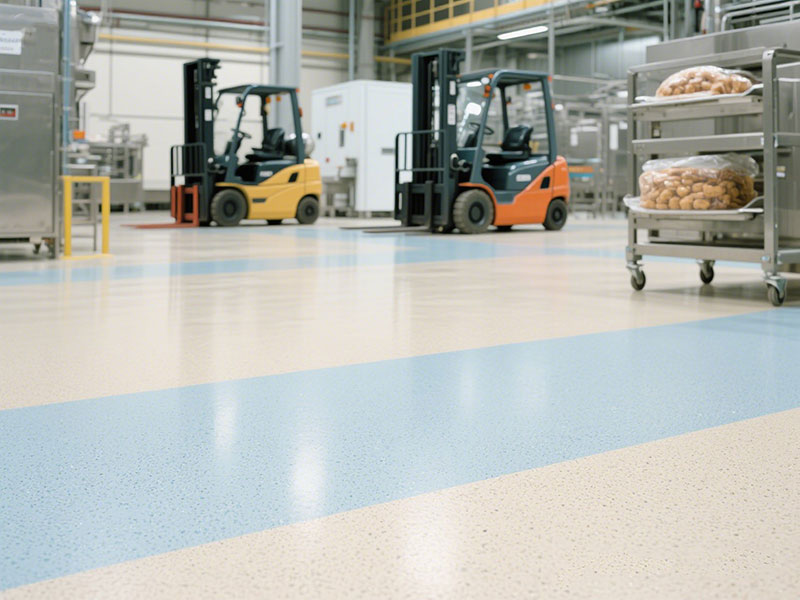
II. Overview of Common Flooring Materials for Food Processing
2.1 Epoxy Flooring
Epoxy flooring is a common industrial flooring material. It is a coating system composed of epoxy resin, curing agent, solvent, etc. Its production process usually includes steps such as base treatment, primer coating, intermediate coating construction, and top – coat painting. First, the ground needs to be sanded, cleaned, etc. to ensure that the ground is flat, dry, and free of oil stains. Then, the primer is applied to make the primer penetrate into the ground and enhance the adhesion between the ground and the coating. Next, the intermediate coating is constructed. The intermediate coating can add fillers such as quartz sand as needed to increase the thickness and wear resistance of the flooring. Finally, the top – coat is painted. The top – coat can provide different colors and gloss, and at the same time, it has good chemical corrosion resistance and aesthetics.
2.2 Polyurethane Flooring
Polyurethane flooring is a flooring material mainly made of polyurethane. It has good flexibility and elasticity and can adapt to slight deformation of the ground. The characteristics of polyurethane flooring make it suitable for some places with high requirements for ground flatness and with vibration or impact, such as the equipment installation area in the food processing workshop. In addition, polyurethane flooring also has good anti – slip performance and wear resistance, which can meet the daily use needs of the food processing workshop. It can achieve different hardness and surface effects through different formulas and construction processes to adapt to different use scenarios.
2.3 Tile Flooring
Tiles, as a traditional flooring material, are also widely used in the food processing industry. Tiles have high hardness and wear resistance and can withstand the rolling of heavy equipment. Their surface is smooth, less likely to accumulate dirt, and easy to clean and disinfect. Tiles come in a wide variety of colors and styles, which can be selected according to the overall design requirements of the food processing workshop to create a beautiful and tidy working environment. Common tile types include glazed tiles, full – body tiles, etc., and different types of tiles have different characteristics and application scenarios.
2.4 Rubber Flooring
Rubber flooring is a flooring material made of natural rubber or synthetic rubber. It has good elasticity and comfort, with a soft foot – feel, which can relieve the fatigue of workers standing for a long time. Rubber flooring also has the function of sound absorption and noise reduction, which can effectively reduce the noise in the workshop and improve the working environment. In addition, rubber flooring is usually made of environmentally friendly materials, meeting the environmental protection standards of the food processing industry. It has good anti – slip performance, especially in wet environments, providing reliable anti – slip protection. Common types of rubber flooring include homogeneous rubber flooring and composite rubber flooring.
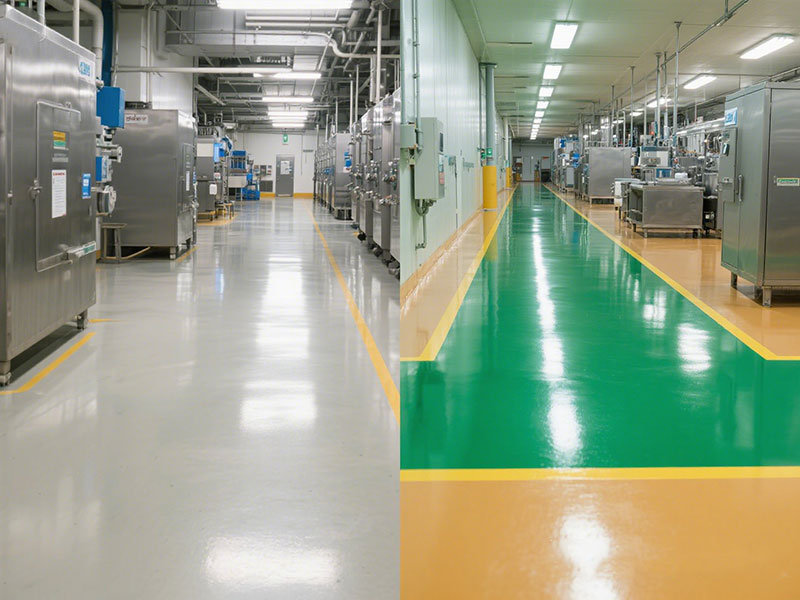
III. Advantages of Different Flooring Materials
3.1 Advantages of Epoxy Flooring
- Chemical Resistance: Epoxy flooring has excellent chemical resistance and can resist the erosion of various chemicals. In the food processing workshop, various cleaners, disinfectants, and acid – base solutions are often used. Epoxy flooring can effectively protect the ground from being damaged by these chemicals. For example, in a dairy processing workshop, epoxy flooring can resist the erosion of acidic substances such as milk and yogurt, maintaining the integrity and stability of the ground.
- Hygiene and Easy to Clean: The surface of epoxy flooring is very smooth and less likely to accumulate dirt. Dust, stains, etc. can be easily cleaned up. The daily cleaning work only requires simple tools such as mops and cleaners. Moreover, epoxy flooring can be thoroughly disinfected, meeting the strict hygiene requirements of the food processing industry. In some food processing areas with extremely high hygiene requirements, such as sterile workshops, epoxy flooring is an ideal choice.
- Aesthetics and Durability: Epoxy flooring can offer a variety of color options, and enterprises can customize it according to the overall design and functional requirements of the workshop. At the same time, epoxy flooring has a long service life, generally more than 10 – 15 years. Its surface hardness is high, able to withstand a certain amount of pressure and wear, and less likely to show scratches and wear, maintaining the beauty and tidiness of the ground.
3.2 Advantages of Polyurethane Flooring
- Flexibility: Polyurethane flooring has good flexibility and can adapt to slight deformation of the ground. In the food processing workshop, due to factors such as equipment vibration and temperature changes, the ground may experience slight deformation. Polyurethane flooring can buffer this deformation through its own flexibility, reducing the occurrence of cracks. For example, in the installation area of some large – scale food processing equipment, polyurethane flooring can effectively prevent the ground from cracking due to equipment vibration.
- Anti – slip Performance: Polyurethane flooring has good anti – slip effects, especially in wet environments. In areas such as cleaning areas and cold storage in the food processing workshop, the ground is often wet. If the floor is not anti – slip, it is easy for workers to slip and get injured. The anti – slip performance of polyurethane flooring can provide a safe working environment for workers and reduce the occurrence of accidents.
- Wear Resistance: Polyurethane flooring can withstand large frictional forces and pressures and is not easy to wear. In the food processing workshop, the frequent movement of people and goods and the operation of mechanical equipment will cause a certain amount of wear on the ground. The high wear resistance of polyurethane flooring can ensure that the ground remains in good condition during long – term use, reducing the cost of maintenance and replacement.
3.3 Advantages of Tile Flooring
- High Hardness: Tiles have high hardness and can withstand the rolling of heavy equipment. In the food processing workshop, heavy equipment such as forklifts and pallet trucks are often used. These equipment are heavy, and if the floor hardness is not enough, it is easy to be crushed. Tile flooring can effectively bear the weight of these equipment, ensuring the flatness and stability of the ground.
- Fire Resistance: Tiles are non – combustible materials and have good fire – resistance performance. In the food processing industry, fire safety is very important. Tile flooring can effectively prevent the spread of fire in case of a fire, providing more time for personnel evacuation and fire rescue.
- Diversity: Tiles come in a wide variety of colors and styles, and enterprises can choose according to the overall design requirements of the food processing workshop. Whether it is a simple and modern style or a retro and traditional style, it can be achieved by choosing the right tiles. In addition, tiles can also create unique visual effects through different splicing methods and pattern designs, enhancing the overall aesthetics of the workshop.
3.4 Advantages of Rubber Flooring
- Comfort: Rubber flooring has good elasticity and softness, with a comfortable foot – feel. In the food processing workshop, workers need to stand and move around for a long time. Rubber flooring can relieve their foot fatigue and improve work efficiency. For example, in some positions that require long – term standing operations, such as the packaging workshop, rubber flooring can provide a more comfortable working environment for workers.
- Sound Absorption and Noise Reduction: Rubber flooring has good sound – absorbing performance and can effectively reduce the noise in the workshop. In the food processing workshop, the operation of mechanical equipment and the handling of goods will generate noise. Long – term exposure to a noisy environment will have an impact on the health of workers. Rubber flooring can absorb this noise, improve the working environment, and protect the hearing health of workers.
- Environmental Friendliness: Rubber flooring is usually made of environmentally friendly materials, containing no harmful substances, meeting the environmental protection standards of the food processing industry. In the food processing process, environmental protection is an important consideration. Rubber flooring does not release harmful substances and will not contaminate food, ensuring food safety.
IV. Disadvantages of Different Flooring Materials
4.1 Disadvantages of Epoxy Flooring
- High Construction Requirements: The construction of epoxy flooring has very strict requirements on the environment and technology. The construction environment needs to be kept dry, clean, and well – ventilated, and the temperature and humidity also need to be controlled within a certain range. If the construction environment does not meet the requirements or the construction technology is not standardized, it is easy to have quality problems such as bubbles, cracks, and peeling. For example, when constructing in a wet environment, epoxy flooring is prone to blistering, affecting its aesthetics and service life.
- Poor Weather Resistance: Epoxy flooring is prone to aging in outdoor or direct sunlight environments. Ultraviolet rays will change the surface color of epoxy flooring, making it dull, and at the same time, it will also reduce its physical properties, making it brittle and fragile. Therefore, epoxy flooring is generally suitable for indoor environments and not suitable for outdoor use.
- Difficult to Repair: Once epoxy flooring is damaged, it is difficult to repair. Since epoxy flooring is an integral coating flooring material, it is difficult to perfectly repair and connect the damaged part with the surrounding ground after local damage, and the repair effect is often not ideal. Moreover, repairing epoxy flooring requires professional construction personnel and equipment, and the cost is high.
4.2 Disadvantages of Polyurethane Flooring
- High Price: Compared with some other flooring materials, the cost of polyurethane flooring is relatively high. This is mainly due to the relatively high price of the polyurethane material itself and its relatively complex construction process, which requires professional construction personnel to operate. For some food processing projects with limited budgets, polyurethane flooring may not be the first – choice flooring material.
- Long Curing Time: Polyurethane flooring takes a long time to fully cure after construction. During the curing period, the ground cannot bear heavy objects and the movement of people, which will affect the construction progress and the normal use of the workshop. For example, in some food processing projects with tight schedules, the long curing time of polyurethane flooring may cause project delays.
- Limited Scratch Resistance: Polyurethane flooring is prone to leave marks under the scratching of sharp objects. In the food processing workshop, there may be some sharp tools or goods moving on the ground, and these sharp objects are likely to scratch the polyurethane flooring, affecting its aesthetics and service life.
4.3 Disadvantages of Tile Flooring
- Fragility: Tiles have a certain degree of fragility and are prone to breakage when subjected to a large impact. In the food processing workshop, there may be situations where goods fall or mechanical equipment collides with the ground. If the tile flooring is subjected to a large impact, it is easy to break. Broken tiles not only affect the aesthetics but may also cause harm to workers.
- Difficult to Clean Joints: The joints between tiles are prone to accumulate dirt and are difficult to clean. In the food processing environment, dirt and bacteria are likely to accumulate at the joints. If not cleaned in time, it will become a hygiene hazard. Moreover, cleaning the tile joints requires special tools and cleaners, increasing the difficulty and cost of cleaning.
- Complex Installation: The installation of tiles requires professional installers, and the installation process is relatively complex. During installation, the flatness and verticality of the tiles need to be ensured; otherwise, it will affect the aesthetics and use effect of the ground. Moreover, the installation of tiles requires a large amount of cement mortar and other materials, and the construction period is long, which will have a certain impact on the normal operation of the workshop.
4.4 Disadvantages of Rubber Flooring
- Poor Heat Resistance: Rubber flooring is prone to deformation and aging in high – temperature environments. In the food processing workshop, there may be some high – temperature equipment or areas, such as baking workshops and cooking workshops. If rubber flooring is exposed to a high – temperature environment for a long time, its physical properties will decline, and problems such as deformation and cracking will occur, affecting its service life.
- Easy to Stain: Rubber flooring is easily stained by certain chemicals or pigments. During the food processing process, there may be some colored liquids or pigments splashing onto the floor. If not cleaned in time, it will leave staining marks on the rubber flooring, affecting its aesthetics. Moreover, the staining problem of rubber flooring is difficult to completely solve. Once stained, it may be necessary to replace part of the flooring to restore its aesthetics.
- High Maintenance Cost: Rubber flooring needs to be regularly maintained to maintain its performance. For example, it needs to be regularly cleaned, waxed, and polished. These maintenance tasks require a certain amount of manpower and material resources. Moreover, the service life of rubber flooring is relatively short. If not properly maintained, it may age and be damaged prematurely, increasing the replacement cost.
V. Considerations for Choosing the Right Flooring Material
5.1 Hygiene Standards
According to the hygiene requirements of the food processing industry, it is crucial to choose flooring materials that are easy to clean and antibacterial. Both epoxy flooring and tile flooring have good hygiene performance, with smooth surfaces, less likely to accumulate dirt, and easy to clean and disinfect. Rubber flooring also has certain antibacterial properties and is made of environmentally friendly materials, meeting the hygiene standards of the food processing industry. When choosing flooring materials, it is necessary to consider whether they can meet the hygiene requirements of the food processing workshop and effectively prevent the accumulation of bacteria and dirt.
5.2 Budget Constraints
Budget is one of the important factors to consider in food processing engineering projects. The prices of different flooring materials vary greatly. Epoxy flooring and polyurethane flooring are relatively expensive, while tile flooring and rubber flooring are relatively more affordable. When choosing flooring materials, it is necessary to balance the price and performance of the flooring material according to the project budget. If the budget is limited, tile flooring or rubber flooring can be selected; if high – performance flooring is required and the budget allows, epoxy flooring or polyurethane flooring can be considered.
5.3 Ground Load
According to the weight and movement of equipment in the workshop, choose flooring materials that can bear the corresponding load. If there are heavy mechanical equipment in the workshop, such as large – scale mixers and forklifts, choose flooring materials with high hardness and good wear resistance, such as tile flooring or epoxy flooring. If the equipment vibration is large, choose flooring materials with good flexibility, such as polyurethane flooring or rubber flooring, to reduce the cracking and damage of the ground.
5.4 Chemical Exposure
If the workshop will be exposed to various chemicals, it is necessary to choose flooring materials with good chemical resistance. Both epoxy flooring and polyurethane flooring have good chemical resistance and can withstand the erosion of chemicals. When choosing flooring materials, it is necessary to understand the types and concentrations of chemicals used in the workshop and the tolerance of the flooring material to these chemicals to ensure that the flooring material can be used stably for a long time.
5.5 Maintenance Difficulty
Evaluate the maintenance requirements and costs of different flooring materials and choose materials that are easy to maintain. The maintenance of epoxy flooring and tile flooring is relatively simple, only requiring regular cleaning and maintenance. The maintenance of rubber flooring and polyurethane flooring is relatively complex, requiring regular waxing, polishing, etc., and it is difficult to repair when damaged. When choosing flooring materials, it is necessary to consider the maintenance ability and cost of the workshop and choose suitable flooring materials.
VI. About JInyu Paint in Food Industry Flooring
6.1 Advantages of JINYU Paint Brand in Food Factory Flooring
The JINYU Paint brand has significant advantages in the field of food factory flooring. Firstly, the brand has a professional R & D team that continuously invests resources in technological innovation and product R & D. This enables its flooring products to keep up with industry development trends and meet the increasingly strict hygiene, safety, and environmental protection requirements of the food processing industry. For example, the flooring coatings developed by JINYUPaint have high – efficiency antibacterial properties, which can effectively inhibit the growth and reproduction of bacteria, providing a more hygienic environment for the food processing workshop.
Secondly, the JINYU Paint brand pays attention to product quality and construction technology. Its flooring coatings use high – quality raw materials, go through strict production processes and quality inspections, ensuring stable and reliable product performance. In terms of construction, the brand has a professional construction team. They have undergone strict training and assessment and have rich construction experience and excellent construction skills. During the construction process, the construction personnel operate strictly in accordance with the specifications to ensure the construction quality of the floor and avoid quality problems such as blisters and cracks.
Thirdly, the JINYU Paint brand provides comprehensive after – sales service. After the delivery of the food factory flooring project, the brand will regularly visit customers to understand the use of the floor and provide timely maintenance and care suggestions. If there is a problem with the floor, the JINYUPaint brand can respond quickly, arrange professional maintenance personnel for repair, and ensure the normal operation of the food processing workshop. In addition, the brand also provides long – term technical support to help customers solve various problems encountered during use.
6.2 JINYU Polyurethane Flooring Coatings
Polyurethane flooring coatings have many advantages in the food processing field. In terms of performance, polyurethane flooring coatings have good flexibility and elasticity. In the food processing workshop, the ground may be slightly deformed due to factors such as equipment vibration and temperature changes. Polyurethane flooring coatings can adapt to this deformation without cracking, thus ensuring the integrity and service life of the floor. For example, in the installation area of some large – scale food processing equipment, polyurethane flooring coatings can effectively buffer the impact of equipment vibration on the ground.
Polyurethane flooring coatings also have excellent anti – slip performance. Food processing workshops usually have wet areas, such as cleaning areas and cold storage. In these places, the ground is prone to water accumulation, increasing the risk of slipping accidents. The surface of polyurethane flooring coatings has a special texture and structure, which can provide good friction and effectively prevent people from slipping even in wet environments, ensuring the safety of workers.
In terms of chemical resistance, polyurethane flooring coatings can resist the erosion of various chemicals. In the food processing process, various cleaners, disinfectants, and acid – base solutions are used. Polyurethane flooring coatings can effectively protect the ground from being damaged by these chemicals, keeping the ground clean and hygienic. In addition, the wear – resistance of polyurethane flooring coatings is also very excellent, being able to withstand the frequent movement of people and goods and the operation of mechanical equipment in the food processing workshop, reducing the wear and damage of the ground.
From an environmental perspective, polyurethane flooring coatings usually use environmentally friendly raw materials, containing no harmful substances, meeting the environmental protection standards of the food processing industry. During the construction process, the volatile organic compound (VOC) emissions of polyurethane flooring coatings are relatively low, causing less pollution to the environment and also ensuring the health of construction workers and workshop staff.
In conclusion, both the JINYUPaint brand and polyurethane flooring coatings have unique advantages in the food processing field. For customers with food processing engineering projects, choosing the polyurethane flooring coatings of the JINYUPaint brand can obtain high – quality flooring solutions to meet the various needs of the food processing workshop.

